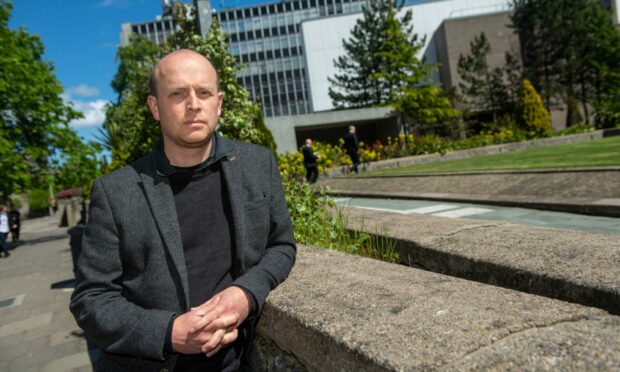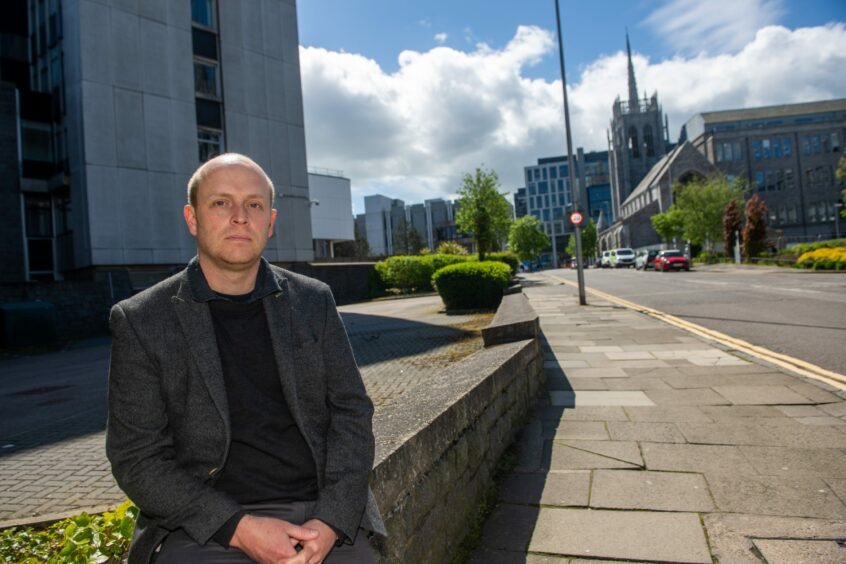A new community-led retrofit co-operative is hoping to help tackle the problem of fuel poverty throughout the north-east and meet ambitious government targets on insulating homes.
Architect Matt Clubb is launching a service to help householders in Aberdeen and Aberdeenshire achieve warmer, healthier, emission-free homes.
Mr Clubb believes Scotland “has the worst housing stock in Europe” when it comes to energy efficiency which is a major stumbling block to achieving targets on greenhouse gas emissions.
The Scottish Government has a target for every home to reach a certain level of energy efficiency as part of a £1.8 billion strategy.
It is estimated this plan will require that 200 homes in the north-east are retrofitted each week for the next ten years, which he described as an “ambitious target”.
What is retrofitting?
Retrofitting is the act of fitting new systems designed for high energy efficiency and low energy consumption to buildings previously built without them.
He has launched North East Scotland RetroFIT (Nesfit) Hub which will offer an assessment service to determine the best option for households and then find contractors to do the work, as well as monitor energy use after the installation to ensure it has done what it was supposed to.
Mr Clubb, who runs his own architectural design business, said: “We have the worst housing stock in Europe when it comes to energy efficiency, which is a legacy from the industrial revolution.
“It’s really apparent that we need to reuse our existing buildings, because of things like the fact 60% of a building’s carbon emissions actually come from its construction.
“If we were to demolish all the buildings and rebuild them, we’d have a huge spike in carbon emissions.
“But obviously there’s more personal things, like everyone’s heating bills and the rise of fuel poverty in the north-east.
“There’s quite a grassroot movement of architects and energy specialists trying to accelerate the speed of retrofit of existing buildings.”
Heat pumps not the answer
The Scottish Government’s Heat in Building Strategy aims to see every house achieve an Energy Performance Certificate rating of “C” by 2033.
Mr Clubb, who is supported by a board of five directors who are all volunteers, said: “When you look at the housing stock of Aberdeen and Aberdeenshire, roughly half the building stock is below that.
“That’s 10 years to retrofit 100,000 homes, which is 200 homes every week.
“That’s a really ambitious target but it’s what we need if we are serious about tackling climate change.
We have the worst housing stock in Europe when it comes to energy efficiency, which is a legacy from the industrial revolution.”
“But the Scottish Government haven’t really said how they are going to deliver that yet.”
Combatting cowboy builders
Getting enough properly skilled people in the trade is a major issue.
The Scottish Government has estimated as many as 16,400 jobs could be supported each year at the peak of the transition in Scotland by the rollout of zero emission heating systems.
However Mr Clubb says the industry currently suffers from bad practice and “rogue traders”.
“There is also historically a lot of distrust in the energy efficiency market. People getting rogue traders installing things that don’t work,” he said.
“On average, you can’t just install a heat pump in a granite house. You need to reduce the energy loss from those buildings by maybe 40%, sometimes 70% before a heat pump is actually viable.
“Heat pumps are getting a huge amount of coverage but they won’t solve fuel poverty. Insulation is what’s going to solve fuel poverty. It’s not a matter of having a bit of double glazing or loft insulation.
“To achieve 40 or 70% savings you need a whole house approach that does things in a sequence, and functions between these things are considered.”
Seeking funding
It is hoped Nesfit will launch at the start of next year and Mr Clubb is keen to try to get some funding lined up.
He said: “We made an application to the Just Transition Fund but weren’t successful, however, we were asked to consider applying next year.
“We are essentially trying to raise funds so we can hire staff.
“In my private business, I get phone calls every week for this from people who aren’t in fuel poverty and can afford to do it and pay the £500.
“I know the Scottish Government has a lot of initiatives for fuel poverty but there’s a whole host of people in the middle ground who have probably just come into fuel poverty.
“If there is any justice in the world, it should be heavily supported and a good thing.
“Once we get to a certain threshold it will be a self-perpetuating business model.
“We’ll make money from doing assessments but we’ll also, as a non-profit business, pour any profits back into helping people who can’t afford to pay £500.
“I’m trying to make a lot of noise about it and, hopefully, get government funding or funding of any kind.”


Conversation